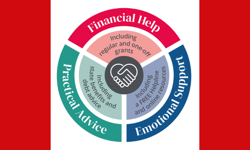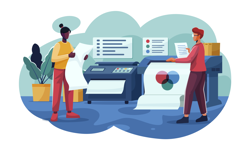Times are tough for every publisher - business to business publishers especially in a marketplace where cash-strapped corporate subscribers have cut costs, social media has undermined traditional recruitment advertising, and breaking news is readily available online 24 hours a day. Yet, while by no means immune to recession, Informa plc, information and academic publisher and the world's largest publicly-owned organiser of exhibitions, events and training, is faring better than many thanks to a well-established digitisation strategy that's now driving a fundamental shift in its business model for information publishing.
Our publishing strategy
"Our business is not built on content distributed in controlled circulation magazines or on magazine advertising," Informa's affable CEO Peter Rigby explains. "In that respect, we're more like an academic publisher. And this is the result of a fundamental transformation of the company over the past ten to twelve years from being a hard copy-based, single subscription-focused business with some advertising, to one that is now almost entirely delivered electronically and is available on subscription with some advertising, some hard copy, and a growing emphasis away from single customers to corporate site licenses."
It's a marked shift away from established publishing thinking - and one made all the more intriguing by Informa's heritage which stretches back more than 300 years. Lloyd's List - launched in 1734, it is one of the world's oldest continuously running publications - is one of Informa's thousands of specialist titles. Along with Scrip Intelligence and Datamonitor, Lloyd's List sits within Professional & Commercial Information (PCI) - one of Informa's three business divisions with products and services spanning a wide range of business and public service sectors from banking to healthcare, telecoms, commodities, law, energy and transport to trade.
As well as being long-standing, however, Informa's business is also characterised by rapid and significant expansion through mergers and acquisitions over recent years. Informa plc was created in 1998 through the merger of Lloyd’s List Publishing with International Business Communications then a subsequent, further merger with academic publisher Taylor & Francis in 2004. And, according to Rigby - Informa's CEO since 1998 and, before that, CEO of IBC since 1989 - it was the tie up with T&F that gave the company the structure and scale that allows it to operate as it does today: with 150 offices worldwide and 8,000 staff producing over 2,000 subscription-based professional and commercial information services, 40,000 print publications and 10,000 events each year.
Alongside PCI sit two other divisions: Events & Training and Academic publishing. The latter includes established names such as the Routledge and Taylor & Francis imprints. And it is thanks to both this spread of product areas and the company's wide-reaching international geographical footprint which have helped bolster its performance in recent years. Half year results for the six months ending June 2011 showed first half growth across the group with overall revenues up 3.1% and profits up 4.2%. In the PCI division, revenues grew ahead of this by 3.3%. Three further figures stand out, however. Publishing currently accounts for 65% of Informa plc's profits. Digital products account for 75% of its publishing revenues. And advertising's share of revenue, meanwhile, is just 2%.
Embracing digital
The move to digital has been a major shift for the business but one made easier by the fact that with its academic and business publishing roots, Informa has always been in the paid-for content (as opposed to advertising-driven) business, Rigby says.
"People have always been used to paying for our content," he explains. "This helped us shift our focus from paper to electronic products, and it is helping us now move towards multiple subscription licenses." He is referring to the growing practice of companies taking out a single subscription allowing multiple staff to access a particular information service online. In this way, the service becomes integrated into staff members' desktops playing an integral role in employees' daily workflow and so the operation of that particular business. "All this has meant that despite the downturn, we have done pretty well because our products are provided direct into our customers' - corporations' - intranets providing need-to-have rather than would-like information that's used daily so is hard to cancel."
The digital evolution at Informa began in 2000/1 with producing e-versions of hard copy newsletters and magazines that were little different to the printed product. "The next step was to add value and charge accordingly - developing greater functionality, depth of information, retro-digitised content, and so on." Rigby says. Ten years on, this strategy is now almost complete. Not that this means the company is about to sit back on its laurels, however, he cautions: "You don't just adapt to digital once - it has to be on-going." Nor does it herald the death of print. "Some printed products remain because some customers want that," he explains. "But a significant proportion of our products are now dual - digital and print. And the same is happening on the academic side with growing interest in e-books."
Demand for e-books is growing fast, though still from a very small base, Rigby says. As important as growing the absolute numbers of e-book sales, however, is the ability to publish and distribute more cost-effectively. Print on demand, for example, is a growing area of activity for Informa. All of which is just another side of Informa's commitment to re-purposing and adding value to the content it creates in a variety of ways that both best serve the demands of a digital audience, and best take advantage of digital platforms' creative and marketing potential.
Overall, the digital transition at Informa has been relatively smooth, it seems. Rigby talks of the flatness of Informa's corporate structure and lack of bureaucracy it enables - a fact that has created a corporate culture that he claims is both flexible and ready to adapt to change. "You've got to be nimble and dynamic in today's market, and not just as a form of self-defence," he observes. "Change is important - not something to be feared."
Go bananas
Corporate responsibility plays an important role in motivating, inspiring and uniting Informa staff worldwide. Around 25 per cent of the business's entire workforce have this year taken part in the banana-themed fun runs the company champions - in which a broad cross-section of staff, including Rigby, don banana suits to raise money for charity - and staff are entitled to paid leave for voluntary work. "The environmental, community and charity commitments we have as a business aren't just there because we have to be seen to be doing them, but because we want to be doing them. Our staff are firmly committed to participating," Rigby adds. "Corporate responsibility makes us a better company. It's about shared values. It's about being modern and grown up."
Moving forward, an important priority for Informa will be to ensure all of its content is available across all platforms that are here today or will emerge tomorrow, he continues. This will require a close eye to be kept on next generations of readers' wants, likes and preferences - a fundamental challenge for B2B and consumer publishers, alike. And it will require the company to maintain its on-going commitment to new product development. "We develop new products all the time across each of our divisions - we will have launched 50 new journals by the end of 2011," Rigby explains. NPD ranges from developing a brand new product from scratch to evolving new products out of existing ones with value added features for digital consumption. There is also a constant flow of products and services successful in one part of the world being adapted then rolled out into markets elsewhere.
"Traditional B2B publishers have to meet head on the challenge of going beyond simply replicated a printed product online but adding value," he believes. "All too often, you still see a traditional player challenged by a newcomer who, with no track record, comes online and steals their market. It happens when the incumbent is too set on trying to hang on to the old product without evolving it. Our peer group have to accept how far things have changed. Already, the way of the world is digital and it will increasingly become multi-subscription. If you're a smaller company, it's undoubtedly tougher because of the costs involved in meeting this challenge, but everyone's got to do it - and at least the costs involved are now coming down."
The future
Looking ahead, his greatest concern isn't technology, however, but the global economy. Over the past couple of years, recession has forced Informa to trim costs and streamline. The company has culled smaller, niche exhibitions, for example, to focus instead on establishing larger, market-leading events. At the same time, it has also benefitted from re-focusing resources onto faster-growing emerging economies. Yet with the bulk of Informa's revenues still coming from the UK, Europe and the US, Rigby says prolonged economic downtown in these developed markets will, inevitably, have an eventual knock-on effect in faster-growing, emerging markets which - for the time being, at least - are buoyant.
The answer, he says, is to remain focused on being content-led as, in most sectors you can think of, it is the market leading events and information sources that are holding onto their position.
"Data and functionality are now what's key on the PCI side of our business, and the immediacy that comes with digital means we live or die by the content we produce each day," he says. "Every day you are measured in a digital world - customers see how much of your content is consumed by their staff, what is accessed how often and by whom. You can take advantage of digital to market your content more effectively, to nudge people to consume it when it is most relevant to their need. But ultimately, the fact is you are on parade the whole time and if you're not up to the mark then people won't pay."










